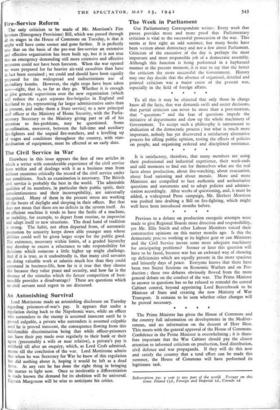The Civil Service in War
Elsewhere in this issue appears the first of two articles in which a writer with considerable experience of the civil service from within and of dealings with it as a business man from without examines critically the record of the civil service under war conditions. Such an examination is necessary. The British civil service is probably the best in the world. The admirable qualities of its members, in particular their public spirit, their conscientiousness and their incorruptibility, are universally recognised. Many of them in the present stress are working all the hours of daylight and sleeping in their offices. But that does not mean that there are no defects in the system itself. As an efficient machine it tends to have the faults of a machine, an inability, for example, to depart from routine, to improvise and adapt itself to new situations. The dead hand of tradition is strong. The habit, not often departed from, of automatic promotion by seniority keeps down able younger men whose abilities could well be given larger scope for the public good. The existence, necessary within limits, of a graded hierarchy may develop to excess a reluctance to take responsibility for decisions which someone a little higher up might challenge. And if it is true, as it undoubtedly is, that many civil servants are doing valuable work at salaries much less than they could command in business-life, how far is it true that they choose this because they value peace and security, and how far is the absence of the stimulus which the fiercer competition of busi- ness-life provides a disadvantage? These are questions which no civil servant need regret to see discussed.






























 Previous page
Previous page